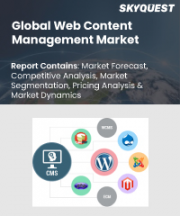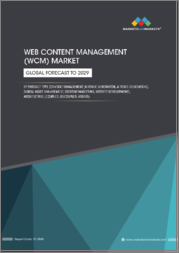
|
시장보고서
상품코드
1642454
디지털 자산 관리 시장 보고서 : 유형, 구성요소별, 용도, 전개, 조직 규모, 최종 용도 분야, 지역별(2025-2033년)Digital Asset Management Market Report by Type, Component, Application, Deployment, Organization Size, End-Use Sector, and Region 2025-2033 |
||||||
디지털 자산 관리 시장 세계 시장 규모는 2024년 77억 달러에 달했습니다. 향후 IMARC Group은 2033년까지 시장이 320억 달러에 이르고, 2025년부터 2033년까지 15.26%의 성장률(CAGR)을 나타낼 것으로 예측했습니다. 디지털 자산관리(DAM) 시장은 디지털 컨텐츠의 급격한 증가, 비즈니스의 세계화, 원격 워크의 상승, 컴플라이언스 확보, 고객 경험 향상, 경쟁력 제공에 있어서 DAM 시스템이 하는 중요한 역할 등에 의해 활황을 보이고 있습니다.
디지털 자산 관리 시장 동향 :
디지털 컨텐츠 폭발
오늘날의 디지털 시대에 이미지, 비디오, 문서 등 디지털 자산의 양과 다양성이 급격히 증가하고 있습니다. 이러한 증가는 주로 마케팅, 엔터테인먼트, 전자상거래 등 업계 전반의 온라인 활동 증가로 인한 것입니다. DAM 시스템은 이러한 자산을 효율적으로 정리, 저장 및 관리하는 긴급한 필요성을 해결합니다. DAM 시스템은 카탈로그화, 검색, 검색 기능을 제공하고, 워크플로우를 간소화하고, 협업을 촉진합니다. 또한 DAM 시스템은 기업이 브랜드 일관성을 확보하고 저작권 규정을 준수하며 전반적인 업무 효율성을 높이는 데 도움이 됩니다. 그 결과, 급성장하는 디지털 컨텐츠의 상황은 광범위한 분야에서 DAM 솔루션의 채택을 뒷받침하고 있습니다.
비즈니스 세계화
비즈니스 세계화는 기업이 세계 시장에서 사업을 전개하고 참여하는 방식을 재구성하는 혁신적인 힘입니다. 기업이 국제 시장으로의 진출을 확대함에 따라 많은 과제에 직면하게 됩니다. 디지털 자산 관리(DAM) 시스템은 디지털 컨텐츠의 원활한 흐름을 보장하는데 매우 중요한 역할을 합니다. DAM 시스템은 디지털 자산의 보관, 정리 및 배포를 위한 중앙 집중화된 견고한 플랫폼을 제공합니다. 이 중앙 집중화는 국제 업무에 대응할 때 특히 중요합니다. 이를 통해 전 세계 팀과 파트너가 디지털 자산에 쉽게 액세스할 수 있습니다.
원격 근무의 상승
원격 근무의 상승은 현대 작업 포스의 결정적인 특징이 되었습니다. 이 새로운 시대의 작업은 클라우드 기반 디지털 자산 관리(DAM) 솔루션의 중요성을 높이고 있습니다. 현재 원격 팀은 다양한 장소에서 활동하고 있으며 원활한 협업을 위해서는 디지털 자산에 안전하고 편리한 액세스가 필요합니다. DAM 시스템은 이러한 원격 근무의 진화에 필수적인 도구로 등장했습니다. DAM 시스템은 현대 작업 환경에 필요한 유연성과 접근성을 제공하여 물리적 위치에 관계없이 팀이 효율적으로 작업할 수 있도록 합니다.
목차
제1장 서문
제2장 조사 범위와 조사 방법
- 조사의 목적
- 이해관계자
- 데이터 소스
- 1차 정보
- 2차 정보
- 시장 추정
- 상향식 접근
- 하향식 접근
- 조사 방법
제3장 주요 요약
제4장 소개
- 개요
- 주요 업계 동향
제5장 세계 디지털 자산 관리 시장
- 시장 개요
- 시장 실적
- COVID-19의 영향
- 시장 예측
제6장 시장 분석 : 유형별
- 브랜드 자산 관리 시스템
- 시장 동향
- 시장 예측
- 도서관 자산 관리 시스템
- 시장 동향
- 시장 예측
- 생산 자산 관리 시스템
- 시장 동향
- 시장 예측
제7장 시장 분석 : 구성요소별
- 솔루션
- 시장 동향
- 시장 예측
- 서비스
- 시장 동향
- 주요 유형
- 컨설팅
- 시스템 통합
- 지원 및 유지 보수
- 시장 예측
제8장 시장 분석 : 용도별
- 판매 및 마케팅
- 시장 동향
- 시장 예측
- 방송과 출판
- 시장 동향
- 시장 예측
- 기타
- 시장 동향
- 시장 예측
제9장 시장 분석 : 전개별
- 온프레미스
- 시장 동향
- 시장 예측
- 클라우드
- 시장 동향
- 시장 예측
제10장 시장 내역: 조직 규모별
- 중소기업
- 시장 동향
- 시장 예측
- 대기업
- 시장 동향
- 시장 예측
제11장 시장 내역: 최종 용도별
- 미디어 및 엔터테인먼트
- 시장 동향
- 시장 예측
- 은행/금융서비스/보험(BFSI)
- 시장 동향
- 시장 예측
- 소매
- 시장 동향
- 시장 예측
- 제조
- 시장 동향
- 시장 예측
- 헬스케어 및 생명과학
- 시장 동향
- 시장 예측
- 교육
- 시장 동향
- 시장 예측
- 여행 및 관광
- 시장 동향
- 시장 예측
- 기타
- 시장 동향
- 시장 예측
제12장 시장 분석 : 지역별
- 북미
- 미국
- 캐나다
- 유럽
- 독일
- 프랑스
- 영국
- 이탈리아
- 스페인
- 러시아
- 기타
- 아시아태평양
- 중국
- 일본
- 인도
- 한국
- 호주
- 인도네시아
- 기타
- 라틴아메리카
- 브라질
- 멕시코
- 기타
- 중동 및 아프리카
- 시장 동향
- 시장 분석 : 국가별
- 시장 예측
제13장 SWOT 분석
- 개요
- 강점
- 약점
- 기회
- 위협
제14장 밸류체인 분석
제15장 Porter's Five Forces 분석
- 개요
- 구매자의 협상력
- 공급기업의 협상력
- 경쟁도
- 신규 진입업자의 위협
- 대체품의 위협
제16장 경쟁 구도
- 시장 구조
- 주요 기업
- 주요 기업 프로파일
- Adam Software
- Canto Inc.
- Celum
- Cognizant Technology Solutions
- IBM Corporation
- Mediabeacon Inc.
- North Plains Systems
- OpenText Corporation
- Oracle Corporation
- QBank
- Webdam Inc.
- Widen Enterprises Inc.
The global digital asset management market size reached USD 7.7 Billion in 2024. Looking forward, IMARC Group expects the market to reach USD 32.0 Billion by 2033, exhibiting a growth rate (CAGR) of 15.26% during 2025-2033. The digital asset management (DAM) market is thriving due to the exponential growth of digital content, globalization of businesses, the rise of remote work, and the crucial role DAM systems play in ensuring compliance, enhancing customer experiences, and providing a competitive edge.
Digital Asset Management Market Trends:
Explosion of digital content
In today's digital age, the volume and diversity of digital assets, such as images, videos, and documents, have grown exponentially. This rise is primarily due to increased online activities across industries, including marketing, entertainment, and e-commerce. DAM systems address the pressing need to efficiently organize, store, and manage these assets. They provide cataloguing, search, and retrieval capabilities, streamlining workflows and fostering collaboration. Moreover, DAM systems help businesses ensure brand consistency, adhere to copyright regulations, and enhance overall operational efficiency. Consequently, the burgeoning digital content landscape propels the adoption of DAM solutions across a wide array of sectors.
Globalization of business
The globalization of business is a transformative force reshaping the way companies operate and engage with markets worldwide. As organizations expand their reach to international markets, they encounter a multitude of challenges, one of which is the effective management of digital assets across borders and diverse time zones. Digital asset management (DAM) systems play a pivotal role in ensuring the seamless flow of digital content. DAM systems provide a centralized and robust platform for the storage, organization, and distribution of digital assets. This centralization is especially critical when dealing with international operations. It ensures that digital assets are easily accessible to teams and partners across the globe.
Rise of remote work
The rise of remote work has become a defining feature of the modern workforce, accelerated by global events that have reshaped the way we work. In this new era of work, cloud-based digital asset management (DAM) solutions have taken on heightened significance. Remote teams now operate from various locations, necessitating secure and convenient access to digital assets for seamless collaboration. DAM systems have emerged as indispensable tools in this evolving landscape of remote work. They offer the flexibility and accessibility needed for modern work environments, ensuring that teams can work efficiently, regardless of their physical locations.
Digital Asset Management Industry Segmentation:
Breakup by Type:
Brand Asset Management System
Library Asset Management System
Production Asset Management System
Brand asset management system accounts for the majority of the market share
Breakup by Component:
Solution
Services
Consulting
System Integration
Support and Maintenance
Solution holds the largest share in the industry
Breakup by Application:
Sales and Marketing
Broadcast and Publishing
Others
Sales and marketing represents the leading market segment
Breakup by Deployment:
On-premises
Cloud
On-premises exhibits a clear dominance in the market
Breakup by Organization Size:
Small and Medium-sized Enterprises
Large Enterprises
Large enterprises dominate the market
Breakup by End-Use Sector:
Media and Entertainment
Banking, Financial Services and Insurance (BFSI)
Retail
Manufacturing
Healthcare and Life Sciences
Education
Travel and Tourism
Others
Media and entertainment are the predominant market segment
Breakup by Region:
North America
United States
Canada
Europe
Germany
France
United Kingdom
Italy
Spain
Russia
Others
Asia Pacific
China
Japan
India
South Korea
Australia
Indonesia
Others
Latin America
Brazil
Mexico
Others
Middle East and Africa
North America leads the market, accounting for the largest digital asset management market share
The market research report has also provided a comprehensive analysis of all the major regional markets, which include North America (the United States and Canada); Europe (Germany, France, the United Kingdom, Italy, Spain, Russia, and others); Asia Pacific (China, Japan, India, South Korea, Australia, Indonesia, and others); Latin America (Brazil, Mexico, and others); and the Middle East and Africa. According to the report, North America accounted for the largest market share.
The market research report has provided a comprehensive analysis of the competitive landscape. Detailed profiles of all major companies have also been provided. Some of the key players in the market include:
Adam Software
Canto Inc.
Celum
Cognizant Technology Solutions
IBM Corporation
Mediabeacon Inc.
North Plains Systems
OpenText Corporation
Oracle Corporation
QBank
Webdam Inc.
Widen Enterprises Inc.
Key Questions Answered in This Report
- 1. How big is the global digital asset management market?
- 2. What is the expected growth rate of the global digital asset management market during 2025-2033?
- 3. What are the key factors driving the global digital asset management market?
- 4. What has been the impact of COVID-19 on the global digital asset management market?
- 5. What is the breakup of the global digital asset management market based on the type?
- 6. What is the breakup of the global digital asset management market based on the component?
- 7. What is the breakup of the global digital asset management market based on the application?
- 8. What is the breakup of the global digital asset management market based on the deployment?
- 9. What is the breakup of the global digital asset management market based on the organization size?
- 10. What is the breakup of the global digital asset management market based on the end-use sector?
- 11. What are the key regions in the global digital asset management market?
- 12. Who are the key players/companies in the global digital asset management market?
Table of Contents
1 Preface
2 Scope and Methodology
- 2.1 Objectives of the Study
- 2.2 Stakeholders
- 2.3 Data Sources
- 2.3.1 Primary Sources
- 2.3.2 Secondary Sources
- 2.4 Market Estimation
- 2.4.1 Bottom-Up Approach
- 2.4.2 Top-Down Approach
- 2.5 Forecasting Methodology
3 Executive Summary
4 Introduction
- 4.1 Overview
- 4.2 Key Industry Trends
5 Global Digital Asset Management Market
- 5.1 Market Overview
- 5.2 Market Performance
- 5.3 Impact of COVID-19
- 5.4 Market Forecast
6 Market Breakup by Type
- 6.1 Brand Asset Management Systems
- 6.1.1 Market Trends
- 6.1.2 Market Forecast
- 6.2 Library Asset Management Systems
- 6.2.1 Market Trends
- 6.2.2 Market Forecast
- 6.3 Production Asset Management Systems
- 6.3.1 Market Trends
- 6.3.2 Market Forecast
7 Market Breakup by Component
- 7.1 Solution
- 7.1.1 Market Trends
- 7.1.2 Market Forecast
- 7.2 Services
- 7.2.1 Market Trends
- 7.2.2 Major Types
- 7.2.2.1 Consulting
- 7.2.2.2 System Integration
- 7.2.2.3 Support and Maintenance
- 7.2.3 Market Forecast
8 Market Breakup by Application
- 8.1 Sales and Marketing
- 8.1.1 Market Trends
- 8.1.2 Market Forecast
- 8.2 Broadcast and Publishing
- 8.2.1 Market Trends
- 8.2.2 Market Forecast
- 8.3 Others
- 8.3.1 Market Trends
- 8.3.2 Market Forecast
9 Market Breakup by Deployment
- 9.1 On-premises
- 9.1.1 Market Trends
- 9.1.2 Market Forecast
- 9.2 Cloud
- 9.2.1 Market Trends
- 9.2.2 Market Forecast
10 Market Breakup by Organization Size
- 10.1 Small and Medium-sized Enterprises
- 10.1.1 Market Trends
- 10.1.2 Market Forecast
- 10.2 Large Enterprises
- 10.2.1 Market Trends
- 10.2.2 Market Forecast
11 Market Breakup by End-Use Sector
- 11.1 Media and Entertainment
- 11.1.1 Market Trends
- 11.1.2 Market Forecast
- 11.2 Banking, Financial Services and Insurance (BFSI)
- 11.2.1 Market Trends
- 11.2.2 Market Forecast
- 11.3 Retail
- 11.3.1 Market Trends
- 11.3.2 Market Forecast
- 11.4 Manufacturing
- 11.4.1 Market Trends
- 11.4.2 Market Forecast
- 11.5 Healthcare and Life Sciences
- 11.5.1 Market Trends
- 11.5.2 Market Forecast
- 11.6 Education
- 11.6.1 Market Trends
- 11.6.2 Market Forecast
- 11.7 Travel and Tourism
- 11.7.1 Market Trends
- 11.7.2 Market Forecast
- 11.8 Others
- 11.8.1 Market Trends
- 11.8.2 Market Forecast
12 Market Breakup by Region
- 12.1 North America
- 12.1.1 United States
- 12.1.1.1 Market Trends
- 12.1.1.2 Market Forecast
- 12.1.2 Canada
- 12.1.2.1 Market Trends
- 12.1.2.2 Market Forecast
- 12.1.1 United States
- 12.2 Europe
- 12.2.1 Germany
- 12.2.1.1 Market Trends
- 12.2.1.2 Market Forecast
- 12.2.2 France
- 12.2.2.1 Market Trends
- 12.2.2.2 Market Forecast
- 12.2.3 United Kingdom
- 12.2.3.1 Market Trends
- 12.2.3.2 Market Forecast
- 12.2.4 Italy
- 12.2.4.1 Market Trends
- 12.2.4.2 Market Forecast
- 12.2.5 Spain
- 12.2.5.1 Market Trends
- 12.2.5.2 Market Forecast
- 12.2.6 Russia
- 12.2.6.1 Market Trends
- 12.2.6.2 Market Forecast
- 12.2.7 Others
- 12.2.7.1 Market Trends
- 12.2.7.2 Market Forecast
- 12.2.1 Germany
- 12.3 Asia Pacific
- 12.3.1 China
- 12.3.1.1 Market Trends
- 12.3.1.2 Market Forecast
- 12.3.2 Japan
- 12.3.2.1 Market Trends
- 12.3.2.2 Market Forecast
- 12.3.3 India
- 12.3.3.1 Market Trends
- 12.3.3.2 Market Forecast
- 12.3.4 South Korea
- 12.3.4.1 Market Trends
- 12.3.4.2 Market Forecast
- 12.3.5 Australia
- 12.3.5.1 Market Trends
- 12.3.5.2 Market Forecast
- 12.3.6 Indonesia
- 12.3.6.1 Market Trends
- 12.3.6.2 Market Forecast
- 12.3.7 Others
- 12.3.7.1 Market Trends
- 12.3.7.2 Market Forecast
- 12.3.1 China
- 12.4 Latin America
- 12.4.1 Brazil
- 12.4.1.1 Market Trends
- 12.4.1.2 Market Forecast
- 12.4.2 Mexico
- 12.4.2.1 Market Trends
- 12.4.2.2 Market Forecast
- 12.4.3 Others
- 12.4.3.1 Market Trends
- 12.4.3.2 Market Forecast
- 12.4.1 Brazil
- 12.5 Middle East and Africa
- 12.5.1 Market Trends
- 12.5.2 Market Breakup by Country
- 12.5.3 Market Forecast
13 SWOT Analysis
- 13.1 Overview
- 13.2 Strengths
- 13.3 Weaknesses
- 13.4 Opportunities
- 13.5 Threats
14 Value Chain Analysis
15 Porters Five Forces Analysis
- 15.1 Overview
- 15.2 Bargaining Power of Buyers
- 15.3 Bargaining Power of Suppliers
- 15.4 Degree of Competition
- 15.5 Threat of New Entrants
- 15.6 Threat of Substitutes
16 Competitive Landscape
- 16.1 Market Structure
- 16.2 Key Players
- 16.3 Profiles of Key Players
- 16.3.1 Adam Software
- 16.3.1.1 Company Overview
- 16.3.1.2 Product Portfolio
- 16.3.2 Canto Inc.
- 16.3.2.1 Company Overview
- 16.3.2.2 Product Portfolio
- 16.3.3 Celum
- 16.3.3.1 Company Overview
- 16.3.3.2 Product Portfolio
- 16.3.3.3 Financials
- 16.3.4 Cognizant Technology Solutions
- 16.3.4.1 Company Overview
- 16.3.4.2 Product Portfolio
- 16.3.5 IBM Corporation
- 16.3.5.1 Company Overview
- 16.3.5.2 Product Portfolio
- 16.3.6 Mediabeacon Inc.
- 16.3.6.1 Company Overview
- 16.3.6.2 Product Portfolio
- 16.3.7 North Plains Systems
- 16.3.7.1 Company Overview
- 16.3.7.2 Product Portfolio
- 16.3.8 OpenText Corporation
- 16.3.8.1 Company Overview
- 16.3.8.2 Product Portfolio
- 16.3.9 Oracle Corporation
- 16.3.9.1 Company Overview
- 16.3.9.2 Product Portfolio
- 16.3.9.3 Financials
- 16.3.9.4 SWOT Analysis
- 16.3.10 QBank
- 16.3.10.1 Company Overview
- 16.3.10.2 Product Portfolio
- 16.3.11 Webdam Inc.
- 16.3.11.1 Company Overview
- 16.3.11.2 Product Portfolio
- 16.3.12 Widen Enterprises Inc.
- 16.3.12.1 Company Overview
- 16.3.12.2 Product Portfolio
- 16.3.1 Adam Software



















